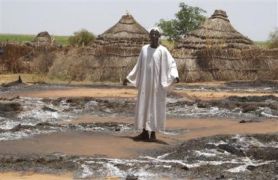Refugees accuse Sudan army of attacking Darfur village
DOW JONES NEWSWIRES
UM HASHAB, Sudan, Aug 30, 2004 (AP) — African Union cease-fire monitors on Sunday investigated claims that the Sudanese military bombarded a village with helicopter gunships, driving terrified farmers from their homes, only days before the U.N. deadline to end the violence in Darfur expires.

|
|
A man from Um Hashab village, North Darfur, gestures his burned hut, after Sudanese military bombarded the village with helicopter gunship on Thursday, August 26, 2004 (AP) . |
Um Hashab village lies in ruins and abandoned after Thursday’s attack on the Sudan Liberation Army, one of two rebel factions waging war against the government in Khartoum.
The charred earth, scorched trees and empty mud and straw huts in the desert settlement provide evidence that the 18-month war continues, despite an April 8 cease-fire. A 24-hour rebel boycott of peace talks in Nigeria ended late Sunday, with insurgents returning to negotiations after a protest walkout over allegations that government forces and allied Arab militia, known as the Janjaweed, continued to target civilians in the arid western region.
“Three days ago they came and dropped bombs on my village,” said Adam Salim Abu Bakir, who fled to the nearby Zam Zam camp for displaced people, some 20 kilometers (12 miles) away from Al-Fasher, the capital of North Darfur.
“It is still burning,” he said, walking through the ash into the ruins of what he said was his brother’s hut, one of around seven destroyed in the attack, as he accompanied The Associated Press to the site.
“I was in the fields planting and the whole village was in flames and everybody was running at the same time. What caused this fire were the planes and the things that they threw on us, and the helicopters with those things that turn round,” he said, waving his hand to mimic the rotors.
“Everybody fled, there is nobody here anymore, not even the young ones. Everything that we wear, that we eat and drink, burnt, but nobody died. Now were are living under the scorching sun. We have nothing.”
Broken earthenware pots and smashed crockery scattered among the ash and crumbling mud walls bear testimony to how quickly the community fled.
“They came with helicopters and planes. We were sitting and the planes came overhead and there was shooting,” said Halima Mohammed, who found refuge in a nearby village.
In Abuja, Nigeria, Sudanese government delegate Najib Abdulwahab questioned the allegations.
“We have already refuted that the government of Sudan has carried out any attacks against the rebels in the region of Darfur. If there have been any breaches, it should be announced by the ceasefire committee,” he said.
A senior AU official who declined to be named confirmed that a team had visited the site and was investigating. An AU source said the commission was mediating between Sudanese officials and the SLA rebels, who are demanding a military outpost some 300 meters from Um Hashab is withdrawn.
In Abuja, representatives of the SLA and the Justice and Equality Movement, another rebel group, said there would be no retaliation.
“We are not going to counterattack, we have committed ourselves to the (cease-fire) agreements signed,” said Ahmed Tugod Lissan, head of the JEM delegation. “The Janjaweed should be disarmed and their leaders arrested.”
SLA delegate Minni Minnawi said the attacks continued Sunday, with the torching of villages 20 kilometers south of Al-Fasher.
His claim could not be immediately confirmed.
More than 30,000 people are thought to have been killed in the violence since the SLA and the Justice and Equality Movement launched their rebellions in February 2003 – escalating years of low level conflict between African farmers and Arab herders, competing for water and land.
The rebels, drawn from African tribes, rose up against the Arab dominated government, claiming discrimination and political marginalization.
Human rights groups, the U.S. Congress and U.N. officials accuse the government of trying to crush the rebellion by backing the Janjaweed – allegations Khartoum repeatedly denies.
The African Union has sent 80 observers to monitor the rarely adhered to cease-fire. Rwanda already has 150 troops on the ground in Darfur to protect the observers, and Nigeria is expected to send 150 troops on Monday.
Lt. Col. Abdul Aziz, an SLA officer seconded to the AU commission, said government troops attacked rebel forces patrolling the area around Um Hashab on Monday, but were forced to retreat to Al-Fasher.
He said the government sent reinforcements, who on Thursday ambushed an SLA patrol.
“Then two helicopters and one Antanov (war plane) came around the area of Um Hashab and dropped about six bombs, and the result was the burning of the village. All the people were scattered and were afraid,” he told The Associated Press.
The U.N. Security Council has given Sudan until Monday to disarm militias drawn from Arabic tribes and end the violence, or face penalties.
U.N. teams who left Darfur on Saturday following a three-day fact-finding mission said Khartoum had improved access for humanitarian groups and that security in the camps had improved.
But Erick De Mul, the U.N. deputy humanitarian coordinator, called for further action to improve human rights and build African villagers’ confidence in the Sudanese police. He said displaced people still complained of attacks and abuse when they venture outside their camps.
At Zam Zam camp, where some 14,000 villagers have found refuge, people said they were still afraid to return home.
De Mul and the two other teams will prepare a report for U.N. Secretary General Kofi Annan, scheduled to be published on Tuesday. The Security Council is expected to meet on Thursday to discuss what steps to take next.
